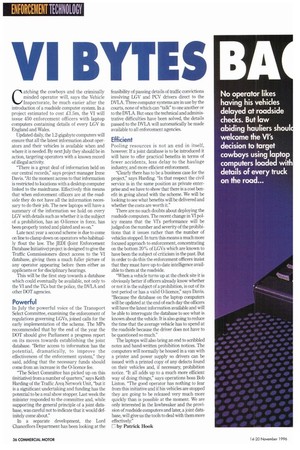BYTES
Page 38

If you've noticed an error in this article please click here to report it so we can fix it.
Catching the cowboys and the criminally minded operator will, says the Vehicle Inspectorate, be much easier after the introduction of a roadside computer system. In a project estimated to cost £1.5m, the VI will issue 450 enforcement officers with laptop computers containing details of every LGV in England and Wales,
Updated daily, the 1.2-gigabyte computers will ensure that all the latest information about operators and their vehicles is available when and where it is needed. By next July they should be in action, targeting operators with a known record of illegal activity.
"There is a great deal of information held on our central records," says project manager Irene Davis. "At the moment access to that information is restricted to locations with a desktop computer linked to the mainframe. Effectively this means that when enforcement officers are at the roadside they do not have all the information necessary to do their job. The new laptops will have a summary of the information we hold on every LGV with details such as whether it is the subject of a prohibition, has an 0-licence in force, has been properly tested and plated and so on."
Late next year a second scheme is due to come on line to clamp down on operators who habitually flout the law. The JEDI (Joint Enforcement Database Initiative) project is designed to give the Traffic Commissioners direct access to the VI database, giving them a much fuller picture of any operator appearing before them either as applicants or for disciplinary hearings.
This will be the first step towards a database which could eventually be available, not only to the VI and the TCs but the police, the DVLA and other DOT agencies.
In July the powerful voice of the Transport Select Committee, examining the enforcement of regulations governing LGVs, joined calls for the early implementation of the scheme. The MPs recommended that by the end of the year the DOT should give Parliament a progress report on its moves towards establishing the joint database. "Better access to information has the potential, dramatically, to improve the effectiveness of the enforcement system," they said, adding that the necessary funds should come from an increase in the 0-licence fee.
"The Select Committee has picked up on this (initiative) from a number of quarters," says Keith Harding of the Traffic Area Network Unit, "but it is a significant undertaking and funding has the potential to be a real show stopper. Last week the minister responded to the committee and, while supporting the general principle of a joint database, was careful not to indicate that it would definitely come about."
In a separate development, the Lord Chancellors Department has been looking at the feasibility of passing details of traffic convictions involving LGV and PCV drivers direct to the DVLA. Three computer systems are in use by the courts, none of which can "talk" to one another or to the DVLA. But once the technical and administrative difficulties have been solved, the details passed to the DVLA will automatically be made available to all enforcement agencies.
Pooling resources is not an end in itself, however. If a joint database is to be introduced it will have to offer practical benefits in terms of fewer accidents, less delay to the haulage industry; and more efficient enforcement.
"Clearly there has to be a business case for the project," says Harding. "In that respect the civil service is in the same position as private enterprise and we have to show that there is a cost benefit in going ahead with the scheme. We will be looking to see what benefits will be delivered and whether the costs are worth it."
There are no such doubts about deploying the roadside computers. The recent change in VI policy means that the VI's performance will be judged on the number and severity of the prohibitions that it issues rather than the number of vehicles stopped. In turn this means a much more focused approach to enforcement, concentrating on the bottom 20% of LGVs which are known to have been the subject of criticism in the past But in order to do this the enforcement officers insist that they must have up-to-date intelligence available to them at the roadside.
"When a vehicle turns up at the check site it is obviously better if officers already know whether or not it is the subject of a prohibition, is out of its test period or has a valid 0-licence," says Davis. "Because the database on the laptop computers will be updated at the end of each day the officers will have the latest information available and will be able to interrogate the database to see what is known about the vehicle. It is also going to reduce the time that the average vehicle has to spend at the roadside because the driver does not have to be questioned so much."
The laptops will also bring an end to scribbled notes and hand-written prohibition notices. The computers will normally be housed in a van with a printer and power supply so drivers can be issued with a printed copy of any defects found on their vehicles and, if necessary, prohibition notice. "It all adds up to a much more efficient way of doing things," says operations boss Bob Linton. "The good operator has nothing to fear from this initiative and if his vehicles are stopped they are going to be released very much more quickly than is possible at the moment. We are only interested in the lawbreaker and the provision of roadside computers and later, a joint database, will give us the tools to deal with them more effectively"
FT by Patrick Hook
















































































































